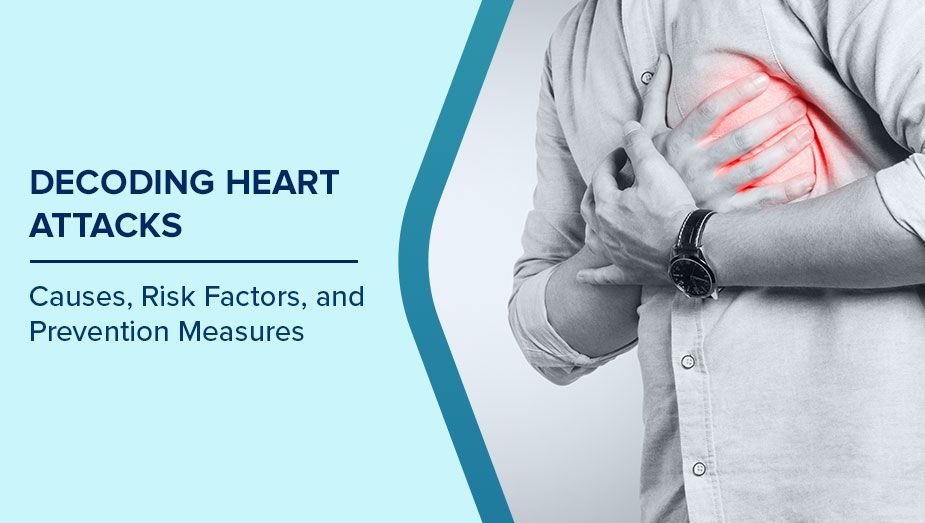- Post By - Dr.Deval Patel Hospital
- Post Date - 2025-05-29
Decoding Heart Attacks: Causes, Risk Factors, and Prevention Measures
Heart attacks, medically known as myocardial infarctions, are among the leading causes of death globally. Despite advancements in medicine, heart attacks continue to pose a major threat, primarily due to lifestyle choices and delayed recognition of early warning signs. Understanding the causes, risk factors, and preventive measures can be life-saving.
What Is a Heart Attack?
A heart attack occurs when the flow of oxygen-rich blood to a section of the heart muscle becomes blocked. This blockage is usually caused by a buildup of plaque (fat, cholesterol, and other substances) in the coronary arteries. If the blockage isn't cleared quickly, the affected heart tissue begins to die.
Common Causes of Heart Attacks
- Coronary Artery Disease (CAD):
The most common cause. Plaque buildup narrows arteries, reducing blood flow. - Spasm of a Coronary Artery:
A temporary constriction of the muscles within the artery wall can block blood flow. - High Blood Pressure:
Damages arteries over time, contributing to blockages. - Blood Clots:
Can suddenly block a narrowed artery. - Drug Use:
Cocaine and similar substances can cause severe spasms of the coronary arteries.
Major Risk Factors
Non-Modifiable Factors:
- Age: Risk increases with age, especially for men over 45 and women over 55.
- Family History: Genetic predisposition to heart disease.
Modifiable Factors:
- Smoking: Significantly increases heart attack risk.
- High Cholesterol: Especially LDL ("bad cholesterol").
- High Blood Pressure: Puts extra strain on the heart.
- Diabetes: High blood sugar levels damage arteries over time.
- Obesity: Increases the burden on the heart.
- Lack of Physical Activity: Sedentary lifestyle weakens cardiovascular health.
- Stress: Chronic stress can raise blood pressure and lead to unhealthy habits.
- Unhealthy Diet: Diets high in trans fats, salt, and sugar contribute to heart disease.
Signs and Symptoms to Watch For
- Chest pain or discomfort
- Shortness of breath
- Pain in arms, neck, jaw, or back
- Cold sweat, nausea, or lightheadedness
- Fatigue and indigestion (especially in women)
Important: Symptoms can vary between men and women. Some heart attacks are "silent" with minimal or no symptoms.
Prevention Measures
1. Eat Heart-Healthy Foods
Focus on fruits, vegetables, whole grains, lean proteins, and healthy fats.
Reduce salt, sugar, and saturated fats.
2. Exercise Regularly
At least 30 minutes of moderate activity most days of the week.
3. Quit Smoking
The risk of a heart attack drops dramatically after quitting.
4. Control Blood Pressure and Cholesterol
Regular check-ups and medications if needed.
5. Manage Stress
Practice yoga, meditation, or breathing exercises.
6. Maintain a Healthy Weight
A balanced diet and regular physical activity help achieve this.
7. Limit Alcohol
Excessive drinking increases blood pressure and calorie intake.
Final Thoughts
Heart attacks can strike unexpectedly, but they’re often preventable. By understanding the causes, recognizing the risk factors, and embracing a heart-healthy lifestyle, you can significantly reduce your risk. Regular health screenings and a proactive approach to wellness can keep your heart strong and healthy for years to come.
Stay informed. Stay active. Protect your heart.
 24/7 Medical Service
24/7 Medical Service
 24/7 Ambulance Service
24/7 Ambulance Service
 Emergency Service -
Emergency Service - 

